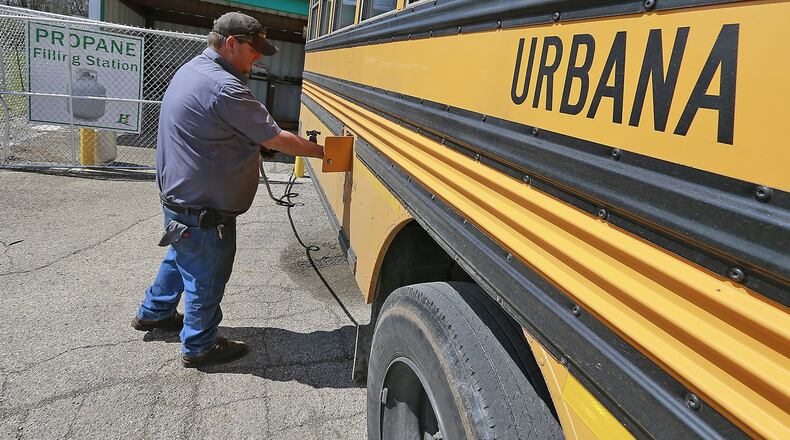RELATED: Champaign County: How healthy are your schools?
Leiker said fuel cost for propane was cheaper than diesel, at $1.29 a gallon vs. $2.35, and that overall maintenance costs per 6,000 miles were cheaper with propane by $300. He said propane is proven to be a better alternative than diesel fueled buses.
“The initial extra cost is quickly absorbed by the savings in fuel and maintenance,” he said.
The School district first introduced propane to their bus fleet in 2015 with the purchase of the three vehicles with the hopes of eventually switching from diesel to the cleaner fuel source. The school system purchased the vehicles at around $84,500 for each, $6,000 to $7,000 more than a comparable diesel bus.
So far school officials say that they are pleased with the overall performances of the propane buses but are still collecting data on them.
READ MORE: Champaign County students pack 75K meals for the hungry
An issue with the propane buses, according to Superintendent Charles Thiel, is that the longevity of the relatively new buses is unclear at this point. Diesel buses have a life expectancy of 10 to 15 years and make up almost the entire Urbana school bus fleet.
Thiel says that they consulted other districts that were already using propane buses about their life expectancy, and while they received positive responses he wants to see how the buses hold up in the next three to five years.
“We are cautiously optimistic about continuing to move in the direction of propane buses for our school district,” he said.
Another concern that the district has with propane is that diesel is more fuel efficient, getting about seven miles per gallon, while propane gets four to five miles per gallon, according to Leiker.
“Instead of refilling it every four days they might be doing it every three days,” he said.
However maintenance cost for the propane powered buses are much cheaper than their diesel counterparts with engine replacements for propane-powered vehicles costing around $9,000, $11,000 cheaper than replacing a diesel engine.
Thiel said propane burns 80 percent cleaner than diesel and that they would not have to deal with the additional cost of keeping their diesel buses up to EPA standards.
Leiker said he is optimistic that once the diesel buses reach their life expectancy that they will be replaced with propane.
“If propane continues to be as successful as we have seen with the three that we have, over time we might get to the point where we have a propane-only fleet,” he said.
About the Author
